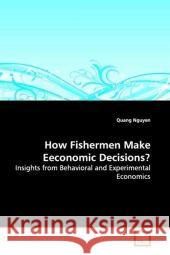How Fishermen Make Eeconomic Decisions? : Insights from Behavioral and Experimental Economics » książka
How Fishermen Make Eeconomic Decisions? : Insights from Behavioral and Experimental Economics
ISBN-13: 9783639121711 / Angielski / Miękka / 2009 / 132 str.
This book provides readers with additional insights into the economic behaviors of fishermen. In particular, we look at how a fishing vessel s captain or owner makes two of the most important decisions in the fishing business. One decision relates to the choice of remuneration practice; the other is concerned with the fishing trip length. The underlying factor of these decision-making processes is the risk behavior of the vessel s captain or owner. The role of risk preferences in the decision-making process is especially emphasized in the context of such a risky profession as fishery. Given that, we also explore the question whether fishermen have different risk patterns from workers in other occupations. Most previous studies addressed this question from the expected utility theory perspective and assumed that fishermen like other workers are risk-averse. We address this question by applying prospect theory and experimental economics methodology to directly estimate the parameters used as proxy for risk behavior as well as to explore how these parameters are determined by socioeconomic and cultural factors.











